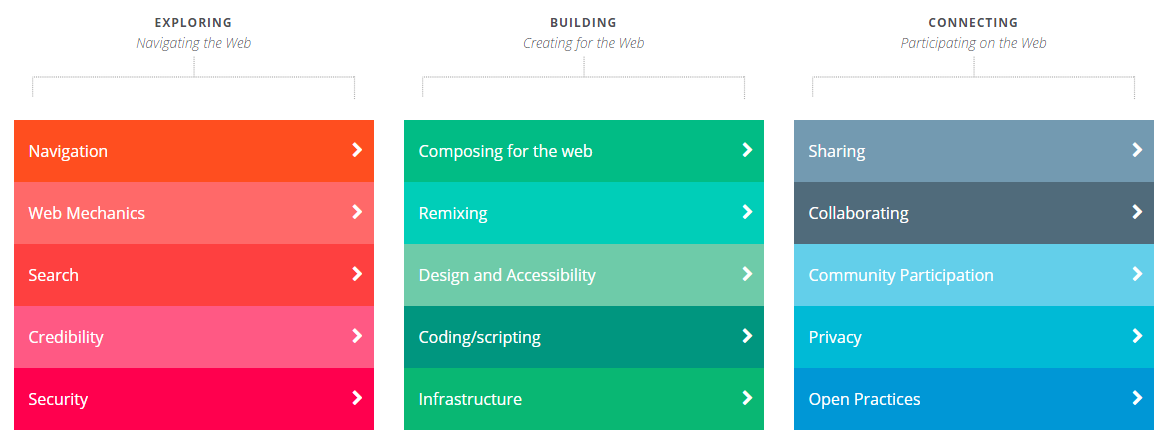Web Literacy
Tim Miller - tim.miller@humboldt.edu - @tmillerLibrary
Using & sharing dynamic tools to learn & teach the Web

Today
- What is & why should we care about Web Literacy? (brief)
- Workshop- hands on activities
- Explanation- why we are using this lesson and what to think about when choosing or creating a lesson plan
- Resources (handout & demonstrated throughout the presentation & workshop)
- understand the importance of Web Literacy
- gain knowledge to move forward on your own
- the real 'work' happens after the workshop
Goals
- This is a condensed version of a longer workshop- we will be skipping around
- It is assumed you have some knowledge about HTML, CSS & JavaScript
- big concepts are what's important
- We have a lot to cover!
- This is a workshop about how to teach a workshop
- please ask questions
- think about what I'm doing and why-
- how would you change it?
Caveats
While we get started...
Please start up your laptop/device and open a web browser
What is Web Literacy?
the skills and competencies needed for reading, writing and participating on the web.
What is Web Literacy?

Many information literacy buzzwords and theories highlight the same basic idea:
Why Web Literacy?
Information literacy is evolving:
ALA (1989)
Mackey, T. P., & Jacobson, T. E. (2010). Reframing information literacy as a metaliteracy. College & Research Libraries, crl-76r1.
-
knowing
-
identifying
-
finding
-
evaluating
-
organizing
- using
SCONUL (UK - 1999)
-
ability to construct strategies for locating information
- ability to synthesize and build upon existing information, contributing to the creation of new knowledge
New frameworks:
Why Web Literacy?
Media Literacy
Mackey, T. P., & Jacobson, T. E. (2010). Reframing information literacy as a metaliteracy. College & Research Libraries, crl-76r1.
- ability of a citizen to access, analyze, and produce information for specific outcomes
- prepares individuals to ‘use information in such a way that others can learn from them’
Digital Literacy
- ability to access networked computer resources and use them
- inclusion of 'digital technologies'
- prepare learner to function in knowlege society
Metaliteracy
- Understand format type and delivery mode
- Evaluate dynamic content critically
- Produce original content in multiple media formats
- Share information in participatory environments
A New Culture of Learning
Why teach Web Literacy?
- Learning-based approach in environments that foster a culture of learning
- Learning through engagement with the content - with the medium
- Practice-
- learn what you don't know
- ask questions
- work with others
(Douglas Thomas & John Seely Brown)
Teach the tools to create content:
Best of all:
It's what they want!
Our Model:
- Hour of Code event series in December
- five evening sessions the week before finals
- Well-attended, repeat attendees, requests for MORE!
- This spring:
- weekly core group working on building a website using the HSU server
- Monthly workshops where the core group will teach hour-long sessions
Today's Workshop
URL Query Strings
Goals - Participants in this session will:
- Learn- What is a query string?
- Explore- How query strings work when you conduct a search
- Explore- manipulate the URL to conduct a search
- Learn- HTML & JavaScript basics
- Explore- HTML & JavaScript basics
- Create- JavaScript application to make a customized search box
Today's Workshop
Questions to explore
What applications are there for using URL query strings?
What sites do we want to search?
What would our users want?
What situations won't work?
What are the limits?
What other considerations are there?
Pedagogies
New Culture of Learning
- Web mechanics
- Search
- Coding/Scripting
- Design & Accessibility
- Sharing
- Open Practices
Mozilla Web Literacy Map
- Active Learning
- Exploration
- Critical Thinking
Let's get started!
Resources
Web Literacy
By Tim Miller
Web Literacy
What it means to teach Web Literacy, some neat tools to help you do so, and a sample workshop.
- 1,680




